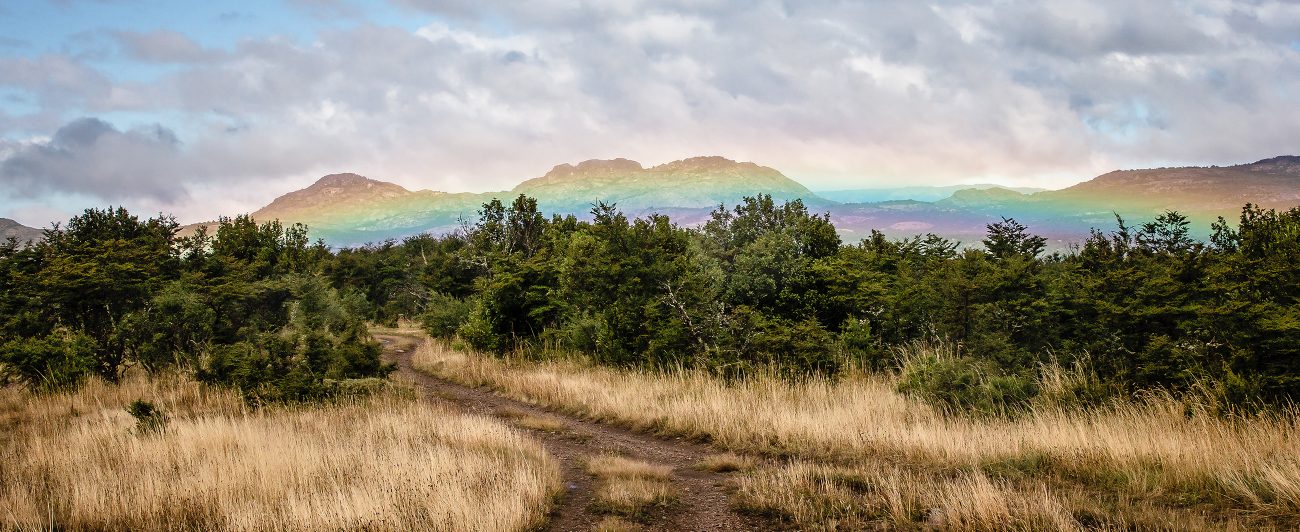Travel
Cue The Tango Scene
Springtime in Patagonia
ABOVE PHOTO Bryan Gregson
I have forgotten my earplugs and there are children on the plane. There are always children on the plane. I glare at their mothers and fathers. I know I should have planned better, but they, too, are certainly lamenting their lack of long-range vision.
Unless you live there, Argentina always begins in an airport, somewhere. I start in Seattle—about as far from Argentina as you can get. It’s midnight when I settle into the plane for the first flight. I have forgotten my earplugs and there are children on the plane. There are always children on the plane. I glare at their mothers and fathers. I know I should have planned better, but they, too, are certainly lamenting their lack of long-range vision.
At 5 a.m., the Dallas airport is full of zombies. Before my layover ends, many of them will have been shipped off to other cities. It’s no wonder zombies are such a problem. Airports do nothing to stop their spread. I’m not sure what time it is when I get to Miami, but I have a layover long enough to be a complete bummer but short enough that I can’t escape the airport. I hunker down and sulk. After a few breezy hours, my friend AJ Gottschalk appears and we wait in some lines and are herded onto another plane. We fly and fly and fly. We pass the equator. We soar over Brazil. We curve over the massive sprawl of Buenos Aires and look down on each neighborhood’s own soccer pitch—River Plate, Boca Juniors, San Lorenzo de Almagro, Independiente, Racing Club. I think it is Sunday. I think the Seahawks are playing the Steelers. I think I still have one more flight.
After another two hours in the air, the long airport nightmare is over. I have no idea what time it is or even what day it is. I do know I’m in Argentina, but it doesn’t feel like it. It feels like I’m waiting for my bags on a blustery spring day in Bozeman. It’s cold and overcast in Bariloche, a city of 100,000 set in the foothills of the Andes in southeastern Argentina. Conspiracy theorists whisper that Bariloche was the home of Eva Braun and Adolph Hitler after the war. It’s an odd thing to hear about a city. I go out for a smoke. It still feels like Bozeman. There are pickups and four-wheel-drive rigs sprawled over the dusty lot. There is scrubland. The wind lifts fumes from diesel and cow and dust. The trucks don’t have Montana tags, however. I believe in what license plates can teach us and these ones say, clear as day, Argentina.
The rest of the crew arrives—photographer Nick Shirghio, host and guide Martin Carranza and angler Jay Levine—there to shoot promo video of two lodges in Patagonia. Flyfishermen—you can spot them from a mile away—slow walkers ambling in sunglasses, baseball caps and flip-flops. It takes forever for the team to locate and assemble gear—it’s the drone, I’m told. It’s always an eternity for it to clear security.
I feel like a nasty strip of carpet lying by the side of the highway. I don’t tell anyone. I don’t really even mind that I feel so shitty and if I don’t know what time it is, what day it is or where the hell I am, what does it matter? Any story I tell myself about how shitty I feel is just that—a story. I flip the script and decide that I don’t really care anymore—that I actually don’t feel all that bad. Hell, I feel pretty good. I start prowling the small aeropuerto for a cold beer. There are hardly any zombies, I don’t see any Nazis and we have a drone.
We drive 150 miles northwest. It sounds like a long way, but in Argentina or Montana or Wyoming or Idaho, 150 miles ain’t shit. This drive mirrors the stark places in those states—but something is different. Where are the billboards? There are none. The truck stops, chain restaurants, cell phone towers, outbuildings, telephone lines—they are just not there. The landscape is free from imposition, except for the occasional mysterious roadside shrine bedecked in red garland, the speck of a shepherd hut far off in the endless vista, a lone gaucho on horseback, miles from anything. I settle in. We are not in Bozeman. This really might be Argentina. It really is springtime.
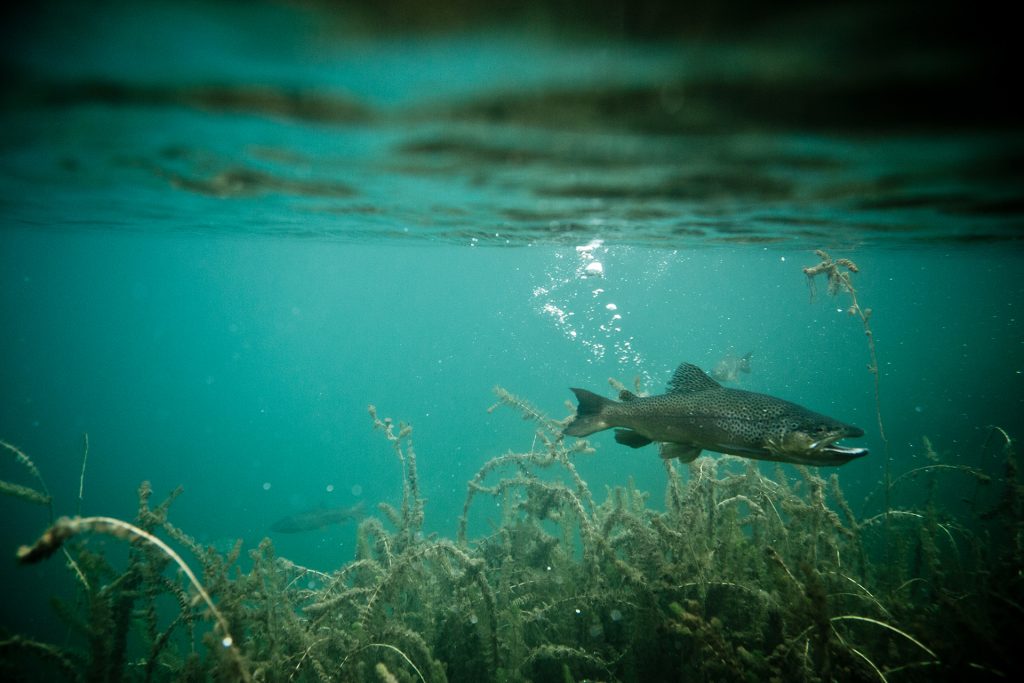
Stoic raptors survey the landscape from canyon crags, songbirds color the air, even the beloved swallows are there, on vacation from the cold north. It’s unlikely, but I wonder if these could be my swallows. The ever-sweet tricksters I marvel at along the banks of the Yakima back in Washington. Maybe. You never know.
Chime Lodge is tucked into a craggy patch alongside the perky Rio Chimehuin—the massive Volcan Lanin is only 20 miles to the northwest. There are wild horses, burley wild hares gallop more than they hop and the sky is filled with birds. All around the lodge the dirt is not dirt; it is dust the consistency of baby powder—fine volcanic ash.
We are shown around, plied with cocktails and then the fishing talk begins. Leaning against the split-rail fences, names of the world’s most mostest drip from bearded chins like they were talking about brunch spots—the Madison, South Andros, Iceland, Christmas Island, The Hoh, The Yellowstone…. I can’t take it anymore, so AJ and I walk down to the banks just to be close to the water. It soothes us. Back at the lodge, they start flying the drone. The vultures, wheeling ever higher, pay no mind.
“Now we know what Patagonia looks like,” AJ says. He’s thinking out loud. Sometimes AJ just wants to talk a bit.
“I think I’ve seen this before,” I say.
AJ nods his head and reaches down to put his hand in the water, as if this small gesture will somehow capture Patagonia—give it feeling. I reach down to touch the water. It is very real, indeed.
The drone finally lands and AJ points to a bird. Wherever I go I judge a place by what sort of birds hang out there and in Patagonia, the birds are wonderful. Stoic raptors survey the landscape from canyon crags, songbirds color the air, even the beloved swallows are there, on vacation from the cold north. It’s unlikely, but I wonder if these could be my swallows. The ever-sweet tricksters I marvel at along the banks of the Yakima back in Washington state. Maybe. You never know.
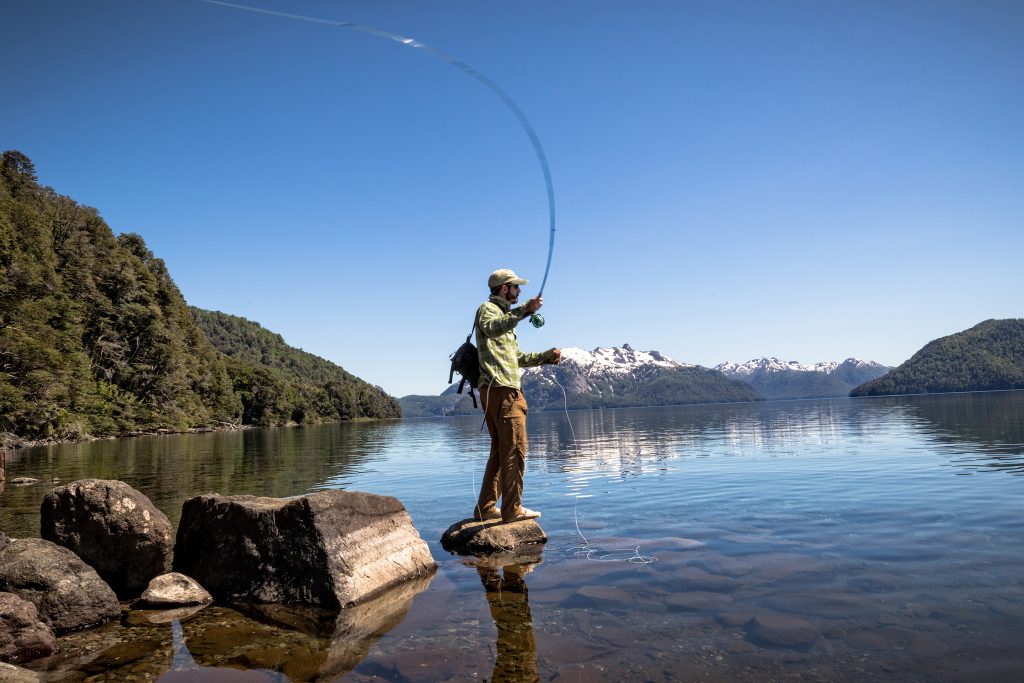
ABOVE AJ Gottschalk casts for gigantic trout on Argentina’s Lago Tromen under the majestic Volcan Lanin. Photo: Nick Shirghio
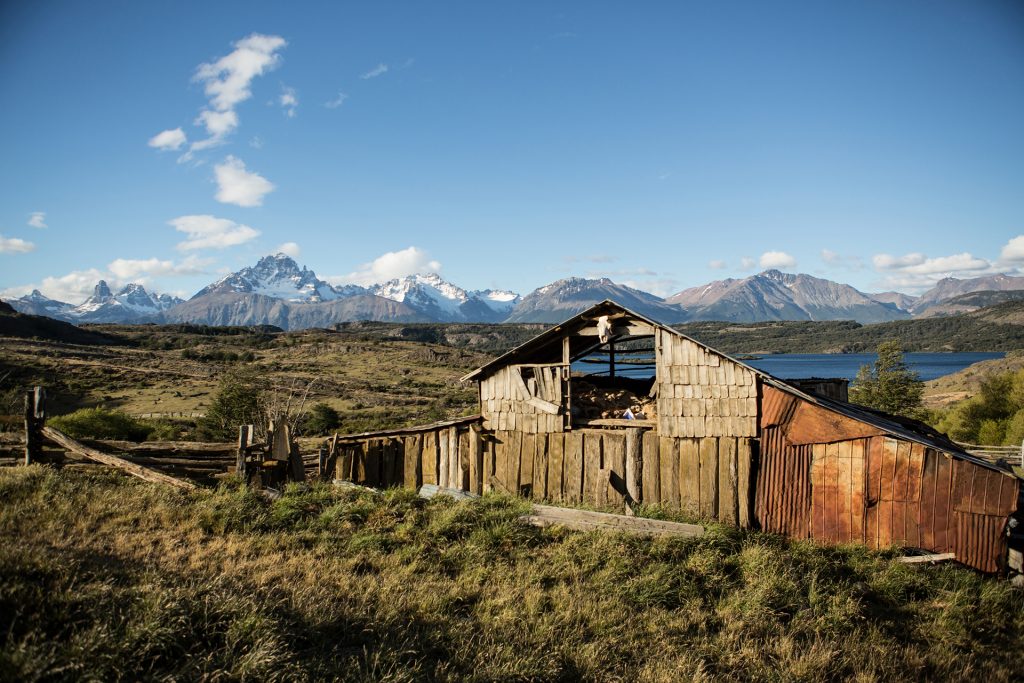
ABOVE“It’s a Sunday morning in Patagonia, Chile. Outside the house, sheepdogs soak up the sun, their faces painted red with blood from a freshly butchered lamb. A gaucho hangs the skin on a wooden beam in the barn his grandfather built more than 100 years ago. Inside, the fire cracks and pops, the radio fuzzes in and out and the ladies chat about the weather.”
Photo: Austin Trayser
I say a few words of thanks to that first trout in Spanish and slide him back home. It feels good to talk to a fish in its native tongue.
The first day of fishing takes us down the Rio Chimehuin—small, twisting over itself in early-season rush and excitement. “Get a load of that thing,” AJ says, pointing toward the river. That thing was an immense, colorful falcon called the caracara. They are everywhere, hopping along the ground, out-thugging massive turkey vultures for a share of winterkill. They are rough customers and our host, Martin, tells us the birds carry facons, the huge, butcher-sized blades usually found lashed inside the bright red belt of a gaucho. “They will tear you up, amigo,” he says.
The Chimehuin is simply lovely—a romantic, painterly stream. In a moment, I have my first Patagonian trout. A brown—a big fella—maybe 16 inches. It had taken me a long time to get to Patagonia, and somewhere back in time, it had taken this fish’s great, great granddaddy a long time to get here, too. He could have come from California, maybe Germany, perhaps England. The history is still a bit fuzzy, but by the early 1900s, trout had a solid foothold in a new land—a land rich with habitat, sustenance and nearly devoid of predators. Like me, the trout had also seen a place like Patagonia before and they liked it. They really liked it.
I say a few words of thanks to that first trout in Spanish and slide him back home. It feels good to talk to a fish in its native tongue. It’s milestone and I crack a Quilmes, Argentina’s ubiquitous fizzy yellow water. There are few things better than a streamside beer after landing an excellent trout and, to no one’s surprise, this sacred law of flyfishing also applies in Argentina.
We stay on the Chimehuin another day, the river widening and growing as it ambles south. The fishing, it seems, gets better every hour. Maybe it is the spring sun warming the river, maybe it is the season’s first vigorous eruption of insect life, maybe it is because I feel, river mile after river mile, I have been fishing this water my whole life. I know what’s around the next bend. I know where the fish are supposed to be. I know just as much as I need to know.
The dusty pickups in the parking lot, engines ticking in the shade, look familiar; the crinkly-eyed guides look like my friends back home; the sun laying light just so along the spine of the Andes makes me think of the Cascades and the post-fishing jokes are all the same. I’d certainly been here before. Patagonia, so far away, now seems so close.
After fishing we retire to Chime Lodge for an embarrassing feast of meat, pickled things, cheese and bottle after bottle of Malbec, Argentina’s deliciously inky red wine. I am not used to pampering—it makes me nervous—but amidst all the luxury, there are familiar signposts. The dusty pickups in the parking lot, engines ticking in the shade, look familiar; the crinkly-eyed guides look like my friends back home; the sun laying light just so along the spine of the Andes makes me think of the Cascades and the post-fishing jokes are all the same. I had certainly been here before. Patagonia, so far away, now seems so close.
“Do you think these dudes know how to shotgun a beer?” I ask AJ. It is a legitimate question. After all, we are not in Patagonia to simply fish. Everywhere we travel, we have the opportunity to be cultural ambassadors. It’s part of the job. I round up an armful of Quilmes while the guides stand around in a circle, kicking at the dirt, shooting the shit like guides do everywhere.
AJ is pretty handy with the Spanish, but it’s obvious these dudes have never shotgunned a beer. Our opportunity—our duty—is clear. The rules are explained. We punch holes in the sides of the cans with Estaban’s massive Argentinean facon and Estaban, Kurt, Marcos, Martin, Jamie, AJ and I stand there with goofy smiles of anticipation, waiting for the lodge’s chef, Angel, to count down—uno, dos, tres….
I’ve gotten no high-fives and no attaboys. I tell my guide, Estaban, to just leave me alone. I lie down and close my eyes. I feel like Morrisey. Time passes. Nothing happens. I open my eyes and small ants are biting my ankles. It is springtime in Patagonia and I am melting down.
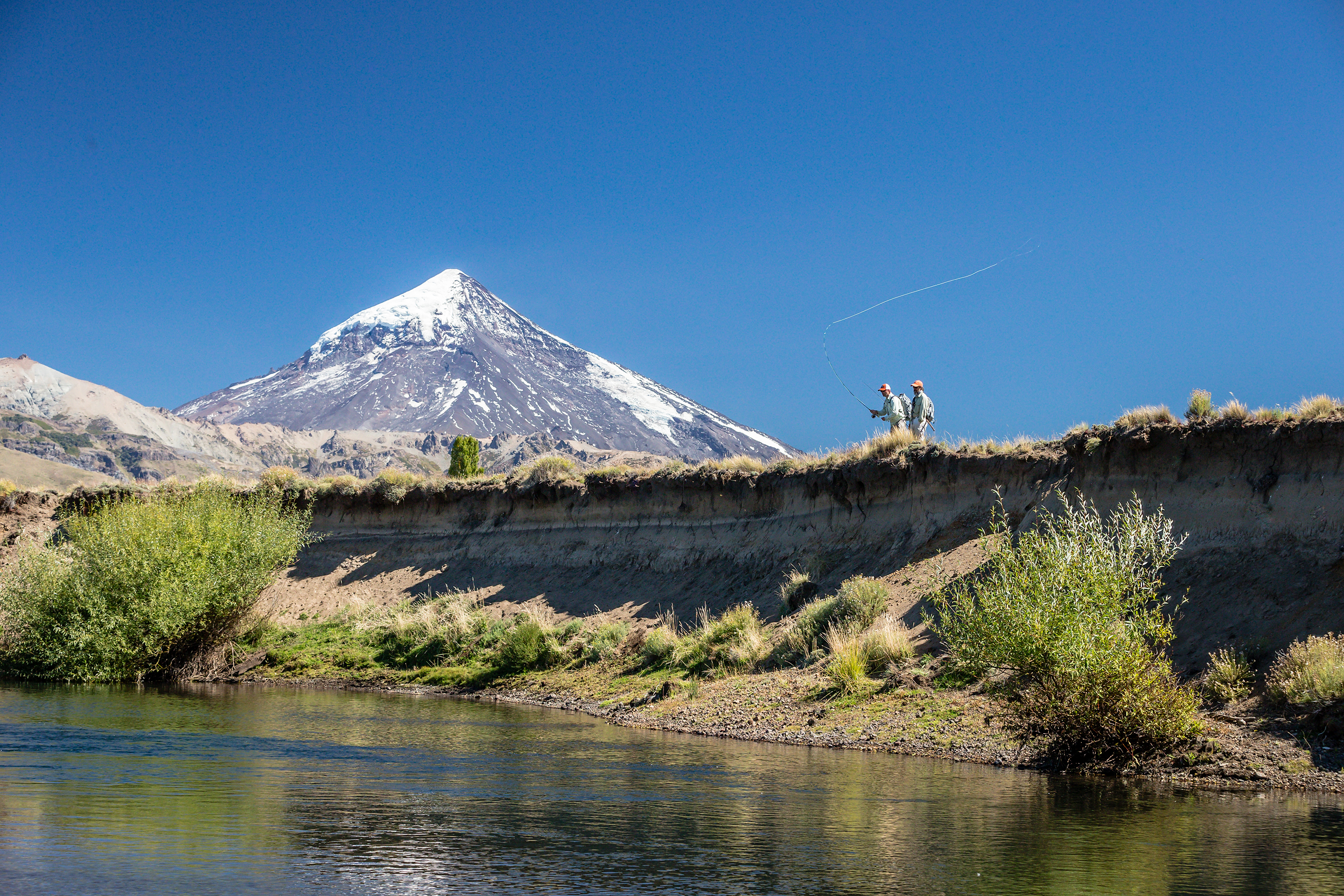
ABOVE John Hudgens and Ron Sorenson target sipping cruisers on the Rio Malleo in Patagonia, Argentina.
Photo: Bryan Gregson
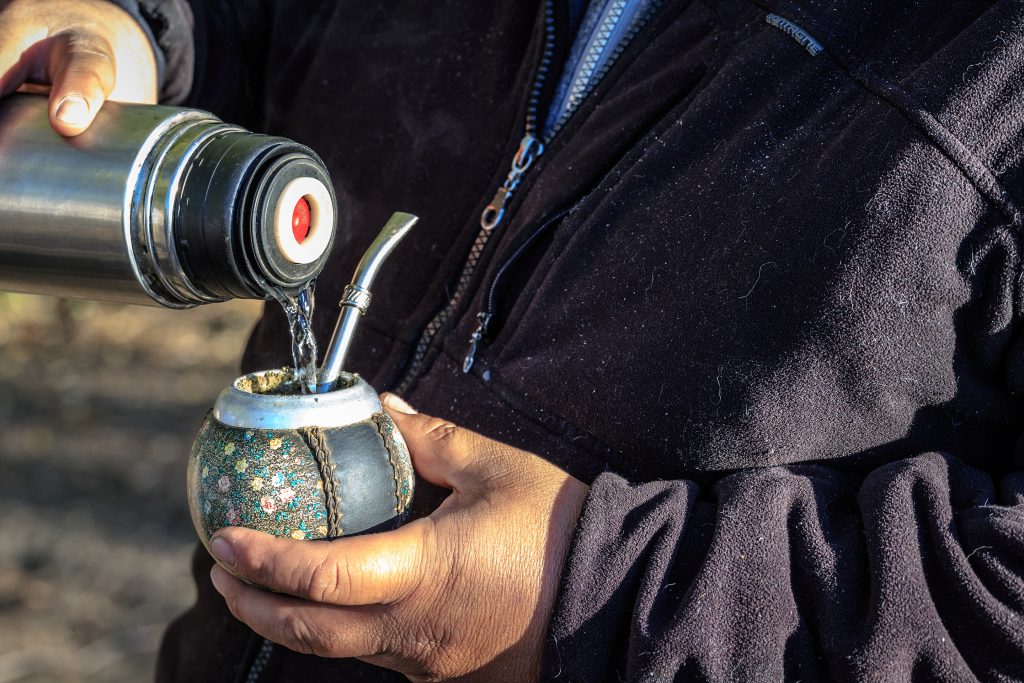
ABOVE Rio Limay camping means waking up with a gourd full of mate and a river full of giant Argentinian browns.
Photo: Bryan Gregson
We drive northeast to the gorgeously empty Mapuche Indian Reservation to fish the Rio Malleo—the alleged home of Argentinean flyfishing. I step out of the truck and, again, the feeling is abrupt—I’ve fished this river. It’s smaller, manageable and clearly showing off its spring finery. It’s the Yakima, the Upper Deschutes, the Crooked, Rock Creek—something small and wild near you. Thousands of miles from home and it feels like I’m in my backyard—it feels like these are my rivers. It feels like my family. That’s an overly sweet way to say it, but the familiarity is so real, so in my face that I have to acknowledge it.
AJ rigs up quickly. “Can you believe this?” he asks. “It’s unbelievable. It’s the perfect trout stream.” He is thinking out loud again, but he’s right. I nod my head and smile. I dip my hand in the water. It is believable. It’s really real. Springtime in Patagonia.
Somehow, I have angered the fishing gods of the Rio Malleo. If it can go wrong it has or it is about to. Maybe it’s the brand new rig I’m fishing because I can’t cast. Maybe it’s the bug I’m fishing, because the trout hate it. Maybe it’s the river because I’ve fallen in twice in 15 minutes. I decide to pout on the bank and console myself with the thought that failure is always a better story than success.
From the bank I can see AJ catching fish after fish. They are browns. Huge browns. Bigger than anything on the Yakima, Upper Deschutes, Crooked or Rock Creek. AJ’s guide slaps him on the back. The photographer gets in close. The light is perfect. The goddam drone starts to fly overhead. Everyone high-fives. Cue the tango scene.
I’ve gotten no high-fives and no attaboys. I tell my guide, Estaban, to just leave me alone. I lie down and close my eyes. I feel like Morrisey. Time passes. Nothing happens. I open my eyes and small ants are biting my ankles. It is springtime in Patagonia and I am melting down.
AJ catches many more fish while I sulk. The guides call lunch and we amble to a grassy spot for empanadas. In Argentina, lunch is usually empanadas, which is an excellent thing. They are perfect. Compact and tasty, empanadas never get soggy and there are no tomatoes to get squashed and gross. Go ahead and dunk them in something. They can take it. Wrap it back up and put it in your pocket. It’ll be excellent in an hour or two.
After lunch it is time for traditional Argentinean mate, but someone has forgotten the thermos of hot water. No matter. There is a solution. AJ’s guide, Marco, builds a small fire. When the coals are nice and hot, he fills a 16-ounce plastic bottle with water. He lays the bottle in the fire just so and within a few moments, the water begins to boil. How is the plastic not melting? How is the water boiling? I feel like a caveman seeing his first wheel. It looks like magic but I am told it has something to do with convection. We pass the ornate, silver-gilded mate gourd and lovely birds wheel above the canyon. The mate is green and strong. After the gourd is drained and refilled a few times, a flask is fished from a dry bag and, with a startling suddenness, everything is just like home—again.
But still, there’s that fish thing—and the fact that I ain’t catching them. I wander to the bank to stare at the water and wonder just what the hell is wrong with me. I can usually avoid that question, but not on this day, not beside this river. Estaban sneaks up behind me and puts his arm around my shoulder. I look up at him, squinting into his crinkly eyes. In his heavy, charming accent, he tells me, “Do not worry about it, Polako. In Argentina, just remember that you must ride the burro.”
I don’t know what this means. I don’t know why he’s suddenly calling me Polako.
“Look, just take your time, see? It will come. You will get there. Ride the burro.” He gives my shoulder a squeeze and we stare at that turkey vulture way up there. In a moment, he ambles away.
AJ, however, is not thinking of the food, the drinks, the fish, the river or our new pals. AJ is thinking about his laundry. He appears with a small pile of damp socks and underpants and begins hanging them on the grates of the brand new, gleaming and elaborate parrilla—the stand where or soon-to-be-lamb-dinner will be roasting.
Hidden in cliffs tagged with ancient rock art just south of the tiny village of Pilolil, the Patagonia River Lodge overlooks the Rio Alumine. We are the lodge’s first-ever guests. Tan and handsome people stand on the porch and welcome us as we straggle in, blinking against the bold spring sun. I imagine they are disappointed by our appearance—they could not have expected this—sunburned, scraggly, bare-foot. They give us hats with the Argentinean flag on the side, push cocktails into our hands and make the best of it. We meet our hosts and they embody everything I’m falling in love with about Argentina. They are smart, funny, openhearted, curious and incredibly generous. The lodge is handsome, indulgent, but still a fishing lodge with guts. There is a helicopter pad, a massive BBQ pit the size of a small swimming pool and bidets in every room. I am not used to such overwhelming comfort. I usually sleep in a tent by the river, a can of bear spray within arm’s reach.
There is to be a grand inaugural feast, an asado. Friends and family have been invited, local dignitaries have been summoned, a baby lamb has been sacrificed, the victuals are piled up in the kitchen—cheese, fruit, sausages, cold cuts—a staggering amount of food. As guests trickle in men begin building a fire in the open pit. It’s a rager and I can feel its heat, even under the newly bold, spring sun. It is Thanksgiving day back home. Here in Argentina this is a Thursday night supper.
AJ, however, is not thinking of the food, the drinks, the fish, the river or our new pals. AJ is thinking about his laundry. He appears with a small pile of damp socks and underpants and begins hanging them on the grates of the brand new, gleaming and elaborate parrilla—the stand where or soon-to-be-lamb-dinner will be roasting.
I don’t notice AJ’s antics right away, but Eduardo, the lodge’s owner, keeps looking toward the asado.
Quite casually, AJ is flipping a sock when I run over. “What the hell, man? What are you doing?” I hiss.
“I’m drying my socks,” he says. “What does it look like?”
“It looks like you are drying your goddamn socks,” I say.
He doesn’t answer. He defiantly cracks a Quillmes and pokes at the blaze. I am mortified and aghast. I am embarrassed for AJ, for me, for all American fishermen who will ever fish this lodge in the future. Despite this complete abandonment of appropriate behavior, it is pretty funny and there is really nothing I can do. I walk over to where the guides are standing in a circle, kicking the dirt, chuckling.
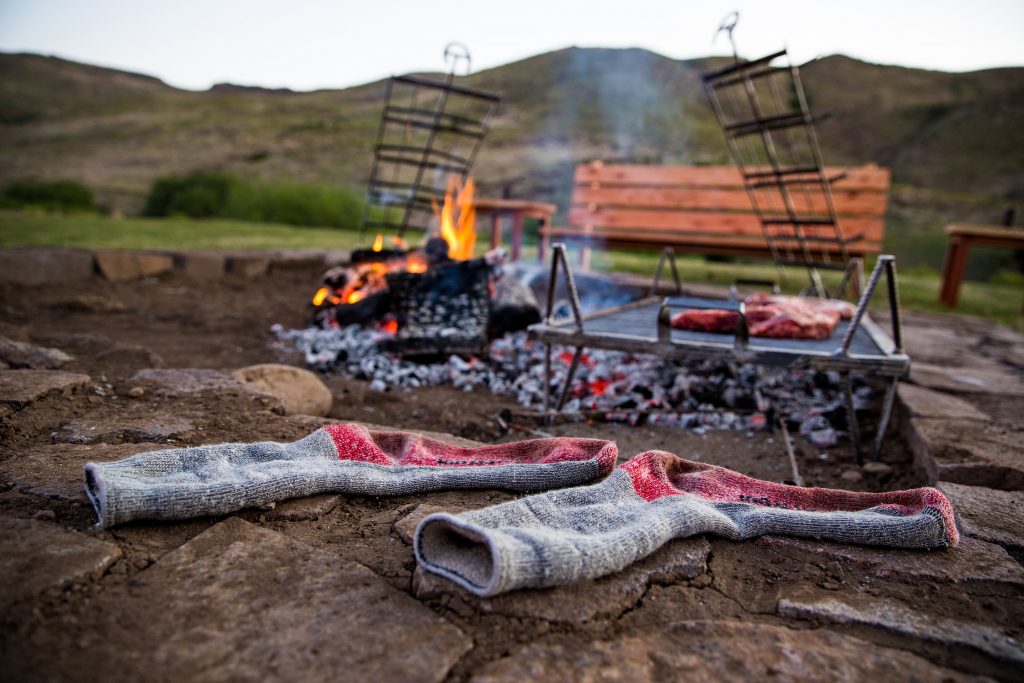
ABOVE Dirtbag dry cleaning. AJ Gottschalk dries his socks near an Argentinean asado at the Patagonia River Lodge.
Photo: Nick Shirghio
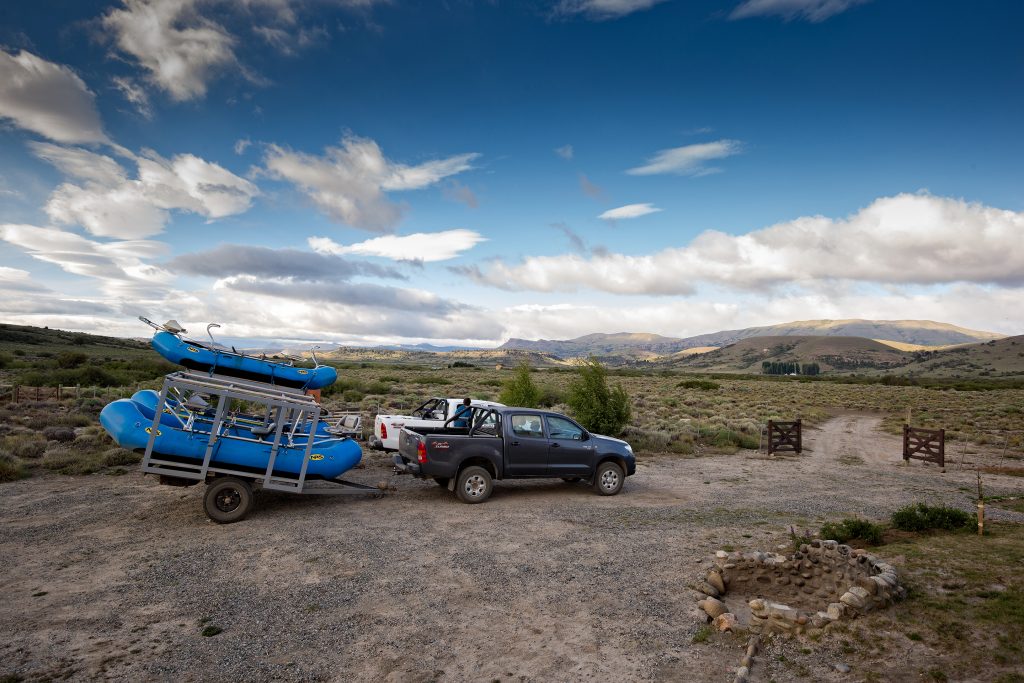
ABOVE Ready to ride. Drift rafts ready for a day on the river near the Chime Lodge in Patagonia, Argentina<
Photo: Nick Shirghio
The Rio Alumine is one of the most remarkable trout streams on the planet. Broad and clear, even in its early-season bustle, it is 100 rivers contained by a single canyon etched by a massive earth chisel.
The Rio Alumine is one of the most remarkable trout streams on the planet. Broad and clear, even in its early-season bustle, it is 100 rivers contained by a single canyon etched by a massive earth chisel. The Alumine throws a series of wonderment and questions at an angler every foot of every river mile. It is remarkable in its range, diversity and surprise. These are nice words to write about any river and in that sense Rio Alumine is, I guess, no more or no less beautiful than any other remarkably beautiful river. But then it was time to catch trout.
My first fish is an enormous brown. Big. Even bigger than that. He comes from nowhere, crushing a streamer splashed tight to the bank. My heart stops for a moment when he turns on the fly. We all see the chase. Then he is on. Then the fight.
I release him. There is glory for El Polako, but then nothing happens. Nothing keeps happening. The river, so gorgeous, is suddenly not giving up the goods. Fish—big Patagonian monsters—should be there, and there and there, but they are not. Where are they?
We stop for lunch and I hunt around random coolers for a stray Quillmas. Then I notice it. Unbelievable. A gaff more egregious than AJ’s laundry debacle—a bunch of bananas sit brown and squashy in tepid cooler water. I pointed into the cooler and yell, “Bananas!”
Everyone stops. Everyone looks. There they are, real as day and tragic as sin. Bananas. In the cooler. On a fishing trip. In Argentina. Monsterland. Springtime. The Alumine. What? How?
I am not superstitious. I don’t read my horoscope. I’m not into metaphysics or religion or lottery tickets. But some things are beyond science. Bananas in a boat are one of those things. Do they have this sort of science in Argentina? Are things different here?
No. Bananas are a no-go in Patagonia, too. The guides are humiliated. How could this happen with a drone droning and El Polako and the gringo who dries his underpants on the asado? One of the older guides, Kurt, calls a meeting with his crew. Something has to be done. After some shouting and then some hugging, the plan is in place. We are to smash the bananas with rocks, yell an insult regarding bananas and then chuck them into the Rio Alumine. Everyone has to do it. Everyone does.
After lunch, AJ begins throwing streamers and I switch over to an oversize, dry attractor pattern. We pound the bank. Fish, suddenly, are where they are supposed to be. Two massive rainbows battle over one perfectly cast streamer. A 23-inch brown sips the dry as delicately as a kitty lapping a bowl of milk. There are huge fish. There are doubles. Trout porn is happening all around us and we can only wonder, was it the bananas? Estaban smiles. “You just had to wait. You just had to climb on the burro.”
Lago Tromen is a bit too beautiful, like a painting by a nature artist who hasn’t yet realized that nature is not supposed to be perfect in every detail. But Lago Tromen is perfect and it holds massive brown, rainbow and brook trout.
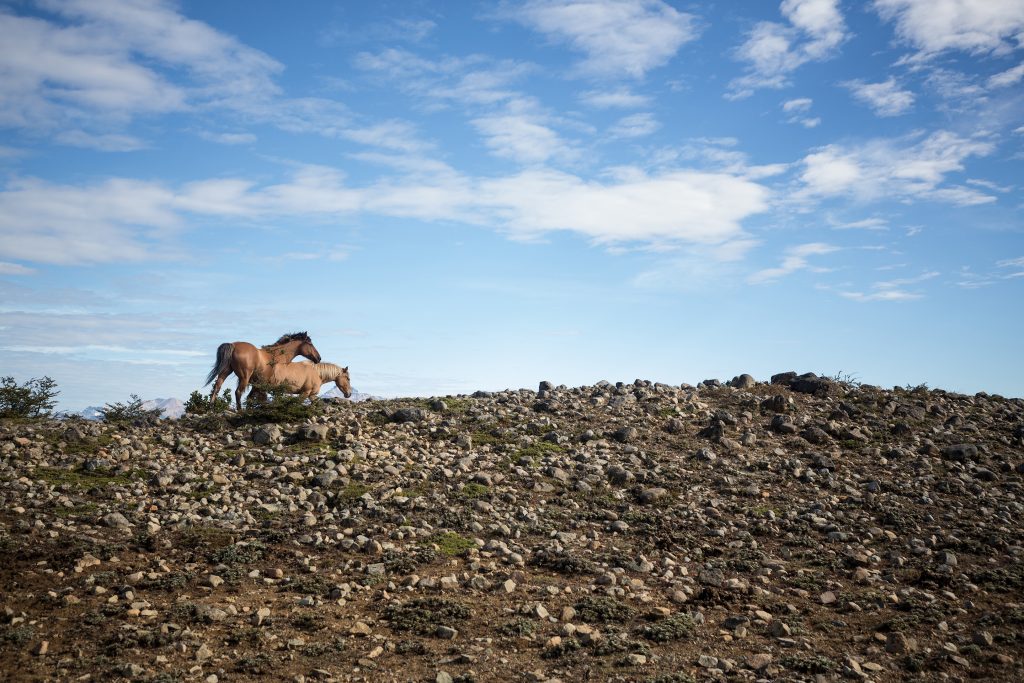
ABOVE Every turn on a Patagonian gravel road reveals
magical moments where time seems to stand still and horses
can still be horses.
Location: Rio Pico, Argentina. Photo: Austin Trayser
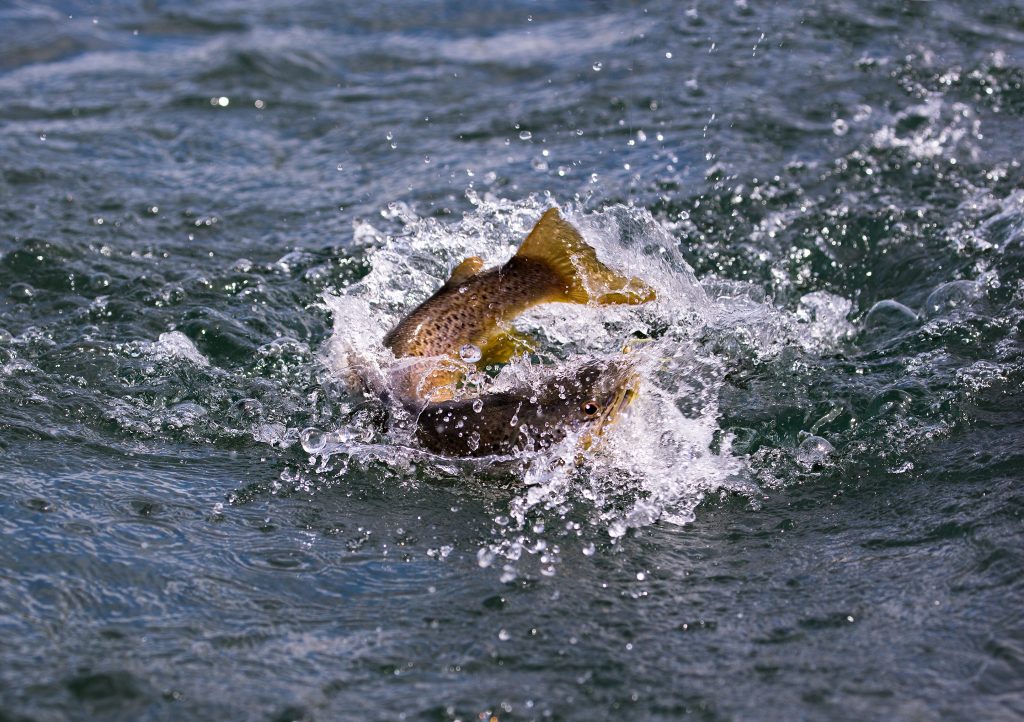
ABOVE An extremely beefy brown trout gets rowdy on Argentina’s Lago Tromen.
Photo: Nick Shirghio
On our final day in Monsterland, we have a decision to make. Hit a small, unfished spring creek we may or may not have access to or roll over to Lago Tromen, a lake at the very base of Volcan Lanin. I vote for the spring creek. I lose. The lake it is.
Lago Tromen is a bit too beautiful, like a painting by a nature artist who hasn’t yet realized that nature is not supposed to be perfect in every detail. But Lago Tromen is perfect and it holds massive brown, rainbow and brook trout. We bomb long casts to the bank, over drop offs and into shady cover. At one point we wade a hard sand bottom and wait for hungry trout to emerge, patrolling the flat like bonefish. It is not like real fishing. It is too good. It is too much. It is overwhelming. After more than a week riddling over why I felt so at home in Patagonia, I am still stumped. Lanin, the massive volcano, looms above us. I think, “vast.” I think, “Mount Rainier.” I think “home” and “backyard.” I am beginning to understand.
I have never fished anything like Lago Tromen. Not a fish less than 16 inches. Not a bum fight on the fight card. Not a moment where I don’t look around in awe and wonder.
We motor back, load the boats and I jump in a pickup that reminds me of my beater back home. Along the way, we get a flat. Someone stops and helps us fix it. I try to tell a joke in Spanish and fail. There are a few beers left in one of the coolers and we drink them on the side of the dirt road, in the middle of nothing, in the middle of everything, in the middle of springtime.
This story originally appeared in The Flyfish Journal Volume 8 Issue 1.
